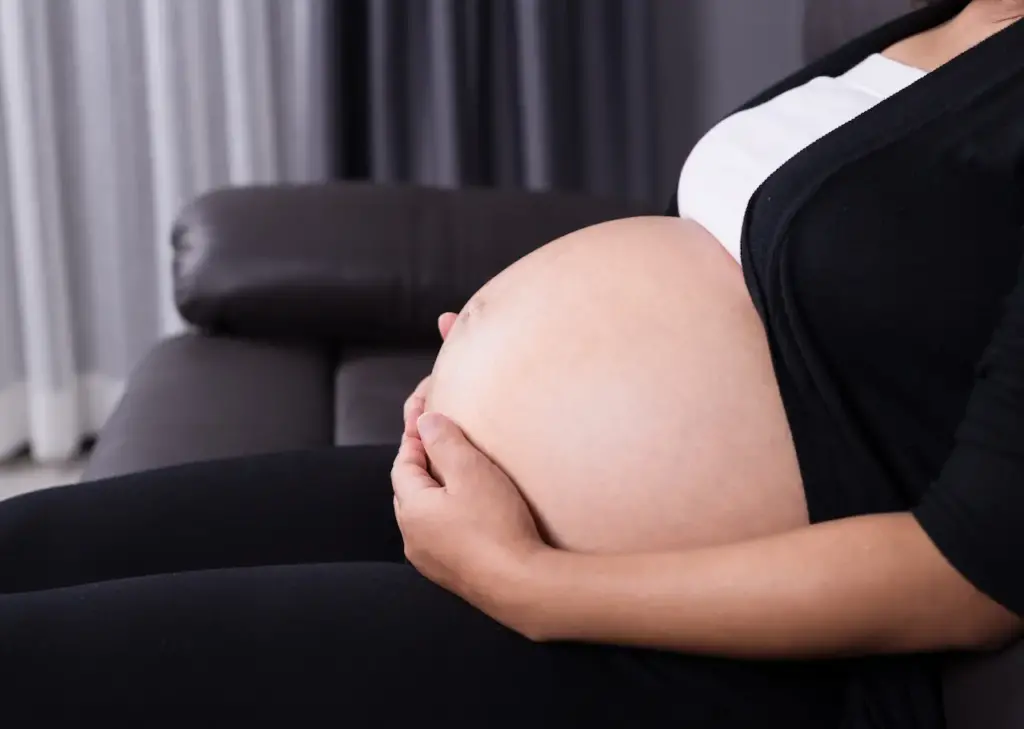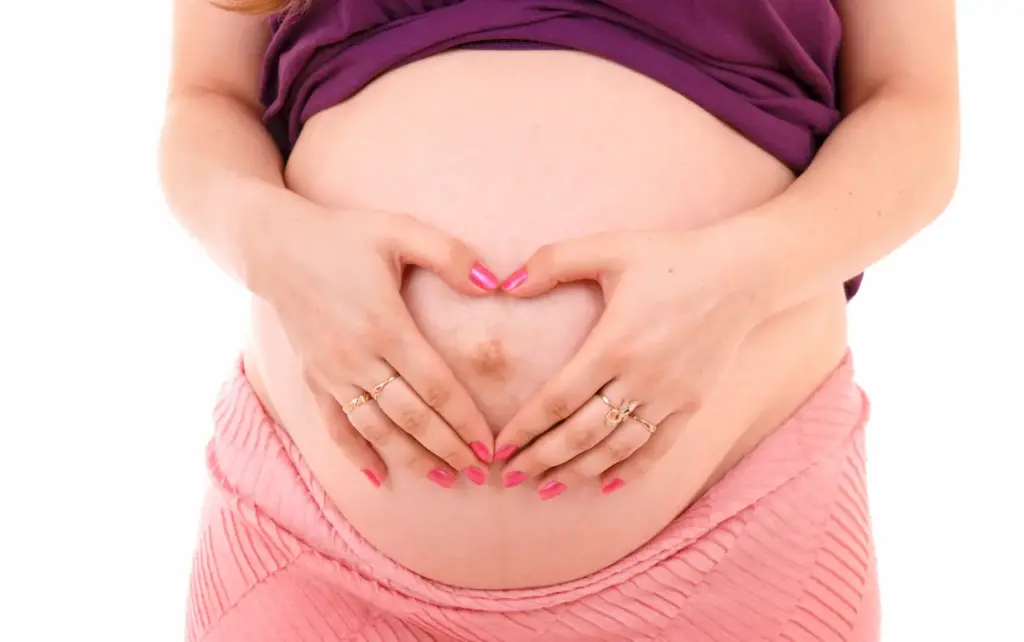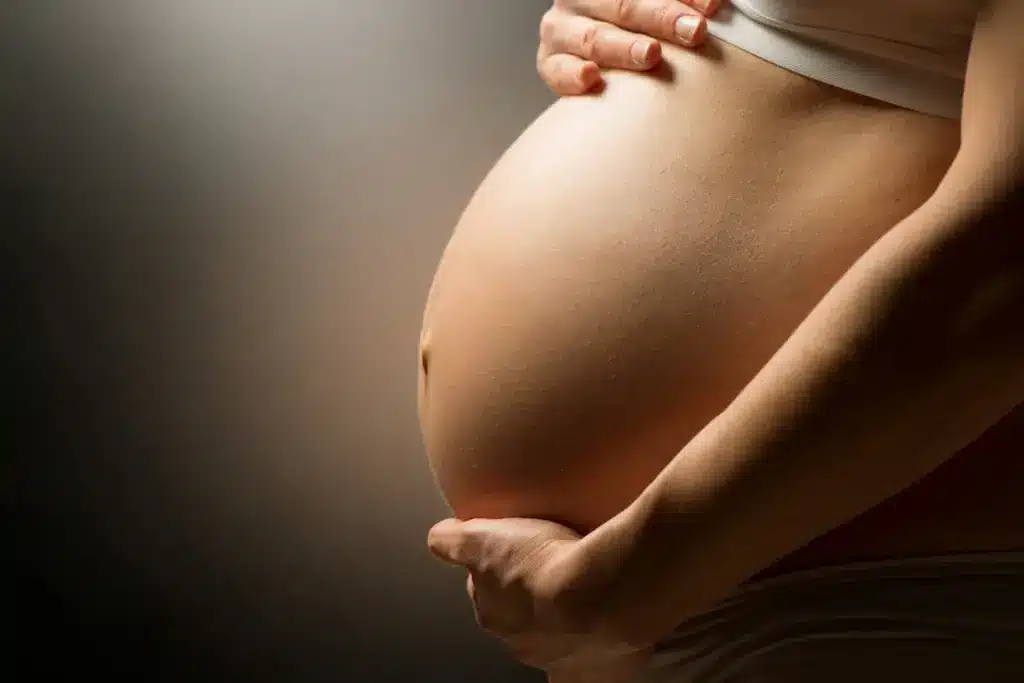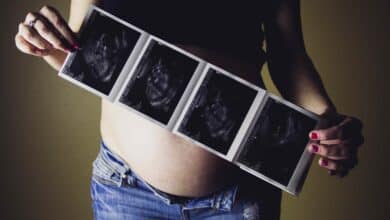Pregnancy Symptoms Week by Week
The Week-by-Week Pregnancy Symptoms
You will experience many changes during pregnancy. These can range from breast tenderness to backaches. These pregnancy symptoms are either expected or unexpected for parents-to-be.
Certain symptoms occur more often than others, even though every person is unique and every pregnancy differs. This list of symptoms for pregnancy by week will help you prepare. But don’t be alarmed if your pregnancy does not follow the exact timeline. Pregnancy can be unpredictable, just like the life you are about to welcome and your new baby. If you have any questions or concerns regarding your symptoms, it is important to speak with a prenatal healthcare provider.

Pregnancy symptoms by week
Are you looking for more information about first-trimester pregnancy symptoms? What about symptoms of the second or third trimester? Our week-by-week pregnancy guide will help you understand the symptoms.
Week One
The first week begins when you start your last period. Doctors will calculate your due date based on the day you had your last menstrual cycle. You are not yet pregnant. However, you can expect to experience the usual menstrual symptoms, such as bleeding, cramps, sore breasts and mood changes.
Week 2
Ovulation usually occurs in what is considered the second week. The ovary releases a matured egg which travels to the fallopian tubes where it is fertilized by sperm. Lower abdominal pain (mittelschmerz), breast tenderness and a slippery discharge resembling egg whites are all symptoms of ovulation.
Week 3
During the third week of pregnancy the fertilized eggs implant into the uterine wall. Some women experience light abdominal cramping and spotting, which is known as ” Implantation bleeding.” If you are bleeding profusely or experiencing intense pain, call your doctor. This could be an ectopic (or outside the uterus) pregnancy.
Week 4
Your at-home pregnancy test can come back positive as early as this week–congratulations! Your bra may feel uncomfortable during this period due to breast tenderness. This is one of the first signs of pregnancy for some women. Others experience mood swings, fatigue, constipation and an enhanced sense of taste or smell. Don’t worry, if none of these symptoms are present. They may take up to a few weeks before they appear.
Week 5
The hormone-induced mood swings may begin as early as the fifth week. You may feel happy, depressed or angry without any apparent reason. Early pregnancy symptoms like fatigue, breast tenderness and nausea can also kick in.
Week 6
Some women experience morning sickness in week six. It may begin earlier or later, depending on the stage of pregnancy. This nausea can be aggravated by your increased sense of smell, leading to food cravings and aversions. It’s important to prepare for the morning sickness that may last until the second trimester. This includes eating smaller portions, taking ginger, wearing wristbands with acupressure, and avoiding trigger foods.
Week 7
Frequent urination can also be a sign of early pregnancy. This is caused by several factors, including the pregnancy hormone, hCG; increased fluids within your body; your kidneys working harder to eliminate waste and, eventually, the growing uterus, which compresses your bladder. Plan to take plenty of bathroom breaks.
Week 8
Many women are experiencing pregnancy symptoms in full force. These include nausea, breast tenderness and fatigue, mood swings, frequent urination as well as bloating. Extra saliva in the mouth can last until the end of the first trimester. Headaches can also be common, thanks to hormonal surges.
Week 9
Did you know that your digestive system can be affected by pregnancy? The hormones of pregnancy can slow down the movement of your intestines. Constipation, excess gas and nausea are common side effects of morning sickness. As your baby grows, your digestive system will slow down. If needed, talk to your doctor about stool softeners.
Week 10
Are you glowing? hormone-induced acne is also common. Your breasts and belly will also grow larger each week.

Week 11
You may experience aches and pains around your abdomen as a result of your growing baby bump. This round-ligament pain may be mildly painful or even unbearable. Leukorrhea, or a creamy or clear discharge in your underwear is also a sign that your body is trying to eliminate bacteria. This is normal during pregnancy.
Week 12
1 Visible veins are one of the side effects, especially in people with lighter skin.
Week 13
Many early pregnancy symptoms will decrease as you approach the end of your first trimester. You may start to feel dizzy all day. These dizzy spells can be attributed to hormonal changes, reduced blood circulation, and low blood pressure. You can combat them by drinking plenty of water and moving slowly.
Week 14
The second trimester is officially underway. This trimester, according to most people, is the easiest. Many people experience increased appetite, energy and sexual desire during the next few months. Take advantage of the “feel-good” trimester and start a fitness routine that is doctor-approved. Also, prepare your home for a baby.
Week 15
You may also experience strange pregnancy symptoms in the second trimester. You may experience a stuffy or runny nose, leg pain and sensitive gums. You may also experience clumsiness at this stage as the hormone relaxin loosens up your ligaments.
Week 16
Around 90% of pregnant women will experience darkening around their nipples. Sometimes the darkening extends to the cheeks and nose (known as “the mask of pregnancy”)–especially if you have a darker complexion.
Week 17
Backaches can be common during pregnancy (thanks to the hormones!). If you feel more forgetful, it could be due to the so-called “pregnancy brain”. Many expectant mothers feel their baby’s kick between weeks 18 to 22. Be on the lookout for this!
Week 18
Your belly may look pregnant to you (but not necessarily to others). Your breasts are also beginning to grow in size as you prepare to make breast milk. You can expect to gain weight until you deliver (usually between half a pound and one pound per week). Even the size of your feet can increase when you are pregnant!
Week 19
Some pregnant women experience heartburn during the second trimester. It is because pregnancy hormones relax your lower esophageal muscles (LES). Try eating smaller portions, standing up after meals and avoiding spicy, acidic or greasy foods. Constipation can also happen when your baby is pressing against your intestines.
Week 20
Your little one may be kicking a lot by now! Your stomach will feel fluttering when you first feel your baby kick. Leg cramps, dry eye, and difficulty sleeping are also common during this period. Try using a pregnancy cushion if you haven’t done so already.
Week 21
You may have had round ligament pains for some time, but they tend to get worse as your baby grows. As your uterus grows, you may experience sharp pains in your hips, groins, and abdomen.
Week 22
You may notice thicker hair, faster nails and shinier skin during pregnancy. This is due to the increased levels of progesterone in your body and your body storing up extra nutrients. Your hair may feel thicker and fuller than normal. You might also experience dry skin, as your stomach is constantly stretched.
Week 23
You may notice that your belly grows and you develop an “outie” button. It will return to normal after delivery. You’ll likely continue to experience leg cramps and brain fog during this period, as well as backaches, headaches, increased vaginal drainage, constipation, headaches and stretch marks.
Week 24
Some pregnant women still experience a high level of sexual desire, while others report a decrease in libido. Some women may feel too tired and sore to perform the act. Other symptoms of pregnancy include tingling and bleeding gums as well as snoring due to nasal hypertrophy, and weight gain.
Week 25
Feel your fingers and hands tingling? Carpal tunnel syndrome is often caused by normal swelling or fluid retention. After giving birth, this numbness should disappear. Try to avoid sleeping with your hands on the pillow and shake your wrists all day.
Week 26
You may find it difficult to sleep as you approach the third trimester. This could be due to leg cramps, anxiety, frequent urination or other discomforts. itching in the hands and feet is also possible. Mild itching is benign and can be treated by antihistamines or soothing lotions. Intense itching, however, may be a sign of a liver condition called cholestasis during pregnancy, which requires medical attention.

Week 27
Some people experience hemorrhoids in the second trimester, which can be as painful as backaches or leg cramps. They can be itchy and swollen and appear in the rectum due to increased blood pressure and flow. Constipation can make them worse. Hemorrhoids can be relieved by a high-fibre diet, plenty of water, hemorrhoidal cream, sitz baths or witch hazel pad.
Week 28
Welcome to the third trimester. You may feel physically tired, and in general uncomfortable as you approach the end of your pregnancy. Aches and discomfort are normal, but some people may have symphysis-pubis dysfunction (SPD), which occurs when the ligaments surrounding the pubic bones become softer and more unstable.
Week 29
You may notice a yellowish colostrum coming out of your breasts in the following weeks as your body prepares for feeding your newborn. This fluid is a precursor for mature breast milk and helps your baby’s body adapt to life outside of the womb. After 28-32 weeks, the blood pressure begins to rise.
Week 30
It’s possible that your symptoms haven’t yet subsided. stretchmarks are likely to be more prominent if you’re pregnant. The red, pink or purple streaks, and even the dark brown ones, are genetically determined. They can’t be avoided, but they will fade over time.
Week 31
You may have been happy to be rid of the first-trimester symptoms, but they could now make a return. Some people may never have experienced them. You may notice that your breasts are tender once again when they produce colostrum. Your bladder may also be pressed against your uterus, and you will need to urinate frequently. Hold on.
Week 32
Braxton Hicks contractions can occur after 20 weeks of pregnancy. These contractions are characterized by a hardening and tightening of your uterus. They become more frequent as you progress in pregnancy. Braxton-Hicks contractions last anywhere between 30 seconds to two minutes and are often irregular. Braxton Hicks contractions are normal, but if they become stronger or more frequent, you should call your doctor.
Week 33
The baby’s growing and pressing on your organs. What’s the result? This can lead to a leaky uterus, shortness in breath, heartburn and general discomfort. Around this time, many women experience upper abdominal pain at the top of the uterus. This is due to the growing uterus stretching the abdominal wall. If you are concerned that it could be something else, talk to your OB. This type of pain usually is tender and gets worse when your baby kicks.
Week 34
As you near delivery, remember that every day counts in the development of your baby. You should let it grow as long as medically possible. As your baby gets ready for delivery, you may notice a change in the intensity of movement. However, if there are any concerns or if the movement is significantly reduced, contact a healthcare provider.
Week 35
Braxton Hicks’s contractions will become more frequent as labour approaches. You should know how to distinguish between these pains and actual contractions. Many women experience insomnia as a third-trimester pregnancy symptom.
Week 36
Your baby is moving! Around two to four months before birth, your baby begins “dropping” (also known as engagement or lightning) into your lower pelvis. This may relieve some pressure on your internal organs and allow you to breathe more easily.
Week 37
The new position of your baby could lead to abdominal discomfort or pelvic pain. If you notice some spotting, don’t be alarmed. This is likely due to your sensitive, enlarged cervical cervix. If you are bleeding like a menstrual period, however, call a doctor. This could be a sign of a placenta issue.
Week 38
Most pregnant women lose their mucus Plug around week 37 or 38. The mucus plug is designed to block the opening of your cervix, protecting your baby against germs. The mucus plug can be released from a few weeks to a few months before the birth of your baby. It looks like a thick pink or red discharge.
Week 39
You may see a small trickle or gush if your water breaks. Early signs of Labor can include regular contractions. Early labour can last several hours. Most healthcare providers advise first-time parents to wait until contractions are every four or five minutes and last one minute. They should then go to the hospital. This is known as the 4-1-1 or 5-2-1-1 rule. However, your provider might have a different opinion.
Week 40
You will likely continue to experience pregnancy symptoms such as insomnia, swelling and pelvic pain until your baby is born. You may have an induction scheduled within the next couple of weeks. After 40 weeks an ultra-sound might be recommended to monitor the position of your baby, its size and fluid levels.
Week 41
It’s normal for your baby to be “overdue” after 40 weeks. An overdue Baby may cause anxiety and restlessness. But, hang in there, and look for signs of labour. Soon, your little one will arrive! Consider using movement (walking, dancing, squatting, etc.) To help your baby to engage in the pelvis, and increase the chances of you going into labour.
Week 42
While it may be exhausting to reach week 42, it is not common. Inductions are recommended by most providers before 42 weeks. Continue to take good care of yourself, and your baby will soon be in your arms.




